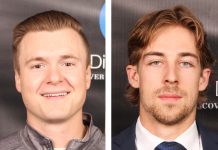Published and televised reports confirm that a lawsuit has been filed in district court against University of Vermont President Judith Ramaley, head hockey coach Mike Gilligan, team captain Kevin Karlander and assistant captains Matt Sanders and Andreas Moborg. The plaintiff is Corey LaTulippe, a local hockey player who tried out for the Vermont men’s hockey team as a walk-on.
The suit comes in conjunction with events of several weeks ago, when hazing allegations were raised against the team. Citing privacy laws, the university’s internal investigation had been kept secret, and earlier the school announced that unidentified players had been disciplined.
LaTulippe, a Williston, Vt., native, was a walk-on goaltender trying to make the UVM squad. In his lawsuit he alleges that freshmen on the team were forced to perform degrading acts, and he has sued for violation of civil rights, assault and battery, invasion of privacy and consumer fraud, and is seeking punitive and compensatory damages.
The suit alleges that freshmen were forced to drink warm beer while lying on the floor in thong underwear while players poured and spat beer at them, and that they were also made to drink shots of liquor by passing them to each other mouth-to-mouth. Both would be violations of UVM’s alcohol policy.
Other alleged hazing actions included the “elephant walk,” in which men walk naked in physical contact while holding on to one another’s genitals, as well as being blindfolded while female strippers rolled on top of them.
LaTulippe also alleges that he was told he would have to perform intercourse with a sheep, and said he was taunted at practice by players making bleating sounds. LaTulippe also says he was forced to surrender his credit card, with which team captain Karlander charged a $900 rafting trip to Maine. LaTulippe was credited with an $850 return, but $50 was held back when he cancelled the trip.
The lawsuit alleges that the University had prior knowledge that hazing would take place, and that LaTulippe was cut from the team after exposing the incidents. The lawsuit claims that LaTulippe first notified officials in September, but that the actions continued.
According to WCAX-TV in Burlington, one of LaTulippe’s attorneys, Mary Kehoe, claimed the University was indifferent to the hazing.
Richie Berger, attorney for UVM, told WCAX that the charges will be defeated in court, saying that a private investigating firm tried to pursue the charges when LaTulippe brought them up, and that he was unwilling to talk unless he was first paid $350,000.
After the initial inquiry into the hazing incident, Gilligan said that there would be changes that would be evident when Vermont took the ice against Niagara last week. In that game, Karlander and Sanders were scratched, while Moborg suited up.
No one at Vermont has been reached for comment, and head coach Gilligan is on a recruiting trip.
Also, according to an Associated Press story, further legal intervention could be underway as Saturday Vermont attorney general William Sorrell appeared to be getting involved. As quoted in media sources, Sorrell said, “There might be some criminal issues there and that piqued my interest.”
“I want to make clear all I know is from media reports,” Sorrell said. “But there’s allegations of underage drinking; there’s allegations that an underage individual or underaged individuals were forced or incited or encouraged to use false identification in one or more bars; there’s allegations of various types of sexual activity of at least a fondling nature that raises questions whether there is some criminality in that area [of] prohibited acts or lewd conduct or whatever.”
“There are allegations that some activities that some could very readily find to be offensive were brought to the attention of officials at the university and … the allegations are that it escalated,” Sorrell said. “I think it’s serious.”
Vermont Gov. Howard Dean, who previously had characterized the matter as an internal university affair, called the situation a crisis Saturday.
“I, at this point, am not willing to use the word ‘cover-up,'” Dean said. “That’s a little bit strong. However, the indication that the university may have known about this before the behavior occurred is very, very serious.”


